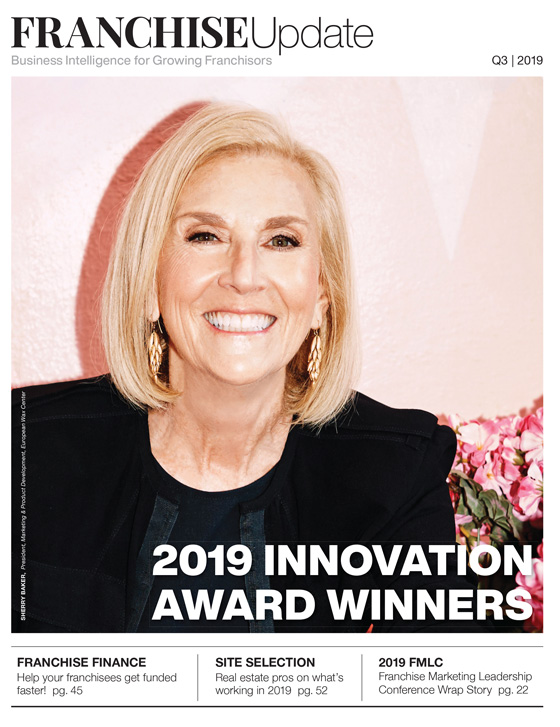Real Estate World: A Global Look at the State of Retail Space

The three major components of the P&L statement of a retail or restaurant franchise unit of any type and in any location worldwide are the cost of goods sold, the cost of labor, and the cost of rent.
In this column, I focus on real estate trends affecting franchising in areas of the world where new franchise development is active. In answer to my question about the state of retail space rent, our correspondents from around the world provided different insights. Of course, a common thread is the cost of rent as a percentage of gross sales. We begin with feedback from a franchisor of a large global residential and commercial real estate brand.
Global
"Coldwell Banker has franchised real estate operations in 44 countries globally, and our parent company Realogy operates in over 100 countries worldwide. The United States has MLS data, numerous regulations, and laws managing the transaction of real estate and the people who perform these actions. These points do not exist in most global markets. This makes it highly important to exercise due diligence on the people and organizations who assist you in handling your real estate requirements." David Riker, Vice President of Global Operations, Coldwell Banker, a subsidiary of Realogy Holding, which also owns Century 21 and ERA Real Estate
Canada
"As so many franchise systems operate in the retail sector, Toronto has become a boomtown for franchising. The huge amount of commercial development and growth in population over the last 10 to 15 years has presented a virtual royal feast for any retail operation looking for good locations. All indications are that this situation will continue for some time to come." Edward (Ned) Levitt, Partner, Dickinson Wright
China
"In the past 20 years of rapid growth of the Chinese economy, real estate and property development has enjoyed an unprecedented record of increase with the urbanization of Chinese society. Tremendous numbers of new shopping malls emerged in every tier of cities across China, which has provided space for both Chinese and international franchised businesses. Different from the U.S. market, standalone locations are quite rare and most franchise businesses choose to operate in malls. High rents and short lease terms are major challenges for most franchisees in China. A 3-year lease term is average. In some high-traffic, high-income areas, the lease term can be for just 6 months. This reflects the fast change of the market with new brands emerging every day and vying for good locations." James Liu, Managing Director, FranChina, Beijing
Contrary to what we see in the news about China's economy, the China Chain Store and Franchise Association (CCFA) says the total sales of the Top 100 retail chains in 2018 were 2.4 trillion yuan (USD358 billion), up 7.7 percent year-on-year. Fung Business Intelligence, May 15, 2019
Hong Kong
"Hong Kong has always been one of the most targeted retail hubs for regional and international brands. It is a small city by geographic size, but a large and competitive market for businesses. Retailers must spend a sizable amount of capital on rent, costs, labor, and marketing campaigns to stay ahead of the game. With the power of an existing brand behind them, franchisees can leverage the established business system, brand recognition, and customer loyalty." Lawrence Wan, Senior Director, Advisory & Transaction Services-Retail, CBRE Hong Kong
Mexico
"Mexican franchises have a very important ally called 'location.' Rent cost is one of the most relevant characteristics when people invest in franchises. It is vital to know the opportunities presented by the real estate market with the opening of new shopping centers throughout Mexico. As of May 2018, there were 738 shopping centers, representing an average of 28,000 square meters (300,000 square feet), totaling 22 million square meters (235 million square feet) of opportunities to locate franchise units." Ferenz Feher, CEO, Feher and Feher, Mexico City; with additional information from May 2018
Singapore
"There are already too many malls in Singapore, and more are being built. The city-state has 6.1 million square meters (65 million square feet) of retail space, of which 8.7 percent is vacant. Yet, a further 364,000 square meters (3.9 million square feet) are forecast to be added, with the biggest chunk hitting the market this year. All this when online shopping is replacing most in-store purchases. Retailers such as Crabtree & Evelyn are closing their physical stores. Many malls now have a much bigger proportion of food and beverage tenants than before. Like almost everywhere, the difference in rental in a mall is based on the unit's location or frontage, size, and floor level and not very much so on the type of business." Albert Kong, CEO/Managing Director, Asiawide Franchise Consultants
Spain
"Spain has seen a tremendous increase in franchised F&B units in the past 3 years as the recession fades and unemployment decreases. Rental costs have been on a rapid rise, although many people think they will go back to normal during 2019. Across Spain there were 911 F&B franchise openings in 2018, 52 percent of the new franchise business openings. Of those, 63 percent were street commercial space, 31 percent in shopping malls, and 6 percent in other locations. Occupancy rates also went up during 2018. The growth was strong for street properties and weak in shopping malls, which are the ones suffering the most from online shopping. By size of location, small locations are the most popular. E-commerce is making many apparel stores change their strategy from many medium-sized stores to few large flagship stores in key locations." Tarsicio Merino Barby, Founder/Managing Director, Almanor International, Madrid
Thailand
"The expansion of urban areas and the consumer's lifestyles in the big cities of Thailand motivated real estate developers to build the mixed-use complexes. Many franchise restaurants choose to locate in the office buildings near residential buildings and public transportation like the Skytrain and metro Bangkok subway. Developers plan to invest more than USD18 billion in mixed-use projects from 2019 until 2025." Sethaphong Phadungpisuth, Managing Director, Gnosis Company, Bangkok
The United Arab Emirates
The massive Dubai Mall and Mall of the Emirates have been known for sky-high rents, high rent increases, and difficult landlords that want a major share of gross sales. Reality is starting to seep into this attractive market with many high spenders who love international brands. "A three-year cap on rent increases would ensure that no landlord can demand more based on his whim. It also assures tenants of a suitable time frame before they need to spend more. It's important to stress that the proposition looks compelling." Gulf News, May 2019
The United Kingdom
"The UK retail market is currently experiencing unique and challenging market conditions, which is not being helped by the added uncertainty over Brexit. This has resulted in many national retailers looking to downsize their store portfolios through various insolvency options. However, this in turn is presenting a lot of opportunities for franchise operators to take advantage of the increase in stock coming to the market." Myles McKinnon, Director, McKinnon Nelson Property Consultants, London
"Real estate costs are a big issue for many franchisors who need prime sites, although things are getting better following some high-profile retail failures and some realism is creeping into the stance taken by landlords. For many brands, location is everything, so the success or failure of the unit will be determined to a great extent by the property costs--not only rent, but also 'rates,' a government tax that typically runs at around 50 percent of the headline rent. Iain Martin, International Franchise Consultant, The Franchising Centre
Bottom line
Our experience developing U.S. food and beverage franchises around the world indicates that for the same restaurant brand the cost of rent can vary from 8 percent to 25 percent of the gross revenue depending on the specific market, having a major impact on the EBITDA of the franchisee. Site selection remains critical for franchises no matter the country. Careful attention also must be given to the rent costs over time to ensure that a franchised unit of any type can be profitable.
William (Bill) Edwards is CEO of Edwards Global Services. EGS offers a complete international operations and development solution for franchisors based on experience, knowledge, a team on the ground in more than 40 countries, and trademarked processes based on decades of problem-solving. Contact him at [email protected] or 949-224-3896.
Share this Feature
Recommended Reading:
FRANCHISE TOPICS
- Multi-Unit Franchising
- Get Started in Franchising
- Franchise Growth
- Franchise Operations
- Open New Units
- Franchise Leadership
- Franchise Marketing
- Technology
- Franchise Law
- Franchise Awards
- Franchise Rankings
- Franchise Trends
- Franchise Development
- Featured Franchise Stories
FEATURED IN

Franchise Update Magazine: Issue 3, 2019








 The franchise listed above are not related to or endorsed by Franchise Update or Franchise Update Media Group. We are not engaged in, supporting, or endorsing any specific franchise, business opportunity, company or individual. No statement in this site is to be construed as a recommendation. We encourage prospective franchise buyers to perform extensive due diligence when considering a franchise opportunity.
The franchise listed above are not related to or endorsed by Franchise Update or Franchise Update Media Group. We are not engaged in, supporting, or endorsing any specific franchise, business opportunity, company or individual. No statement in this site is to be construed as a recommendation. We encourage prospective franchise buyers to perform extensive due diligence when considering a franchise opportunity.